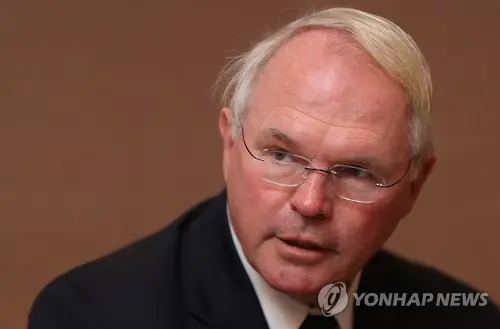The incoming administration of Donald Trump should not let the issue of defense cost sharing with South Korea hinder more important cooperation on DPRK, a former senior U.S. diplomat and chief negotiator with Pyongyang said Monday.
Former Assistant Secretary of State Christopher Hill made the case during a security forum, warning that unless Trump puts together a robust policy on DPRK, he could end up running his re-election campaign amid accusations he's failed to stop the North from developing nuclear-tipped missiles.
Cooperation with South Korea is key to any robust policy aimed at stopping the North, he said.
"If I'm President Trump, I also don't want to go to 2020 and have to run a campaign on the basis that I allowed DPRKto become a nuclear weapon state .... I think there needs to be a much more robust set of policies aimed at stopping it," Hill said during the forum on the Korea-U.S. alliance.
Putting too much focus on burden sharing in relations with South Korea would hurt cooperation on the North, he said.
South Korea and the U.S. have long shared the cost of American troops stationed in South Korea under what is known as the Special Measures Agreement (SMA). South Korea currently pays about half the cost of hosting 28,500 American troops. During the campaign, however, Trump vowed to have Seoul and other allies shoulder more of the burden.
"Do we really want to go into the special measures issues, burden sharing, to have all kinds of problems with the ROK when what we really need is a close relationship with ROK on DPRKand some other issues? I don't think so," Hill said.
"So I think that good relationship means we need to kind of clear the decks of some of these problems and I hope we will clear the decks on special measures," said Hill, who also served as ambassador to South Korea and chief negotiator with Pyongyang.
Hill said the cost-sharing issue is expected to have affect European allies more than Seoul and Tokyo as the two Asian allies have done a good job in sharing the cost.
"When you look closely at what Korea has done in terms of sharing these military costs, and if you look at what Japan has done, I think these two countries have a pretty good story to tell," he said.
Hill stressed the seriousness of the DPRKproblem, warning that the regime is truly bent on developing nuclear-tipped missiles.
"This testing program that the DPRKs have been engaged in, this is not an effort to get our attention. This is not an effort to somehow provoke us or rattle us. This is a military testing program. We've seen time and time again when their missiles fail, they put up another missile and try again. If their test doesn't quite have the yield, they have another nuclear test," Hill said.
"This is a military program. As this military program goes forward, it is clear that it is going forward for one purpose, that is, to put a deliverable nuclear weapon, which they claimed they have a design for now, and put it on top of a missile," he said.
Hill also said that Seoul and Washington should work together to ensure Chinese cooperation, adding that any solution to the DPRKproblem will involve China. He warned, however, that it would do more harm than good for either Seoul or Washington to go to China on its own.
Hill, however, reacted negatively to the potential imposition of "secondary sanctions" on Chinese firms doing business with DPRK, saying the U.S. should be careful about taking such measures as Beijing could take retaliatory steps that could hurt U.S. economic interests.
Thickening up missile defenses should also be a key element of any DPRKpolicy, he said.
Former South Korean Foreign Minister Han Sung-joo said the U.S. Congress should remind the incoming administration that when it comes to defense cost-sharing, South Korea is doing more than any other U.S. ally.
"I think both the current U.S. administration and most of Congress know that the Republic of Korea is assuming more percentage or more share of the cost of the alliance than any of the other allies of the United States, including Japan and NATO allies," he said during the same event.
Seoul is also spending more on defense, some 2.6 percent of GDP, than any of the other U.S. allies, he said.
"Alliance is a lot more than cost and money. There is a lot of interest and stake with the United States. You can't just count the value of it. The United States is not helping South Korean defense for money," Han said.
(YONHAP)
 简体中文
简体中文

